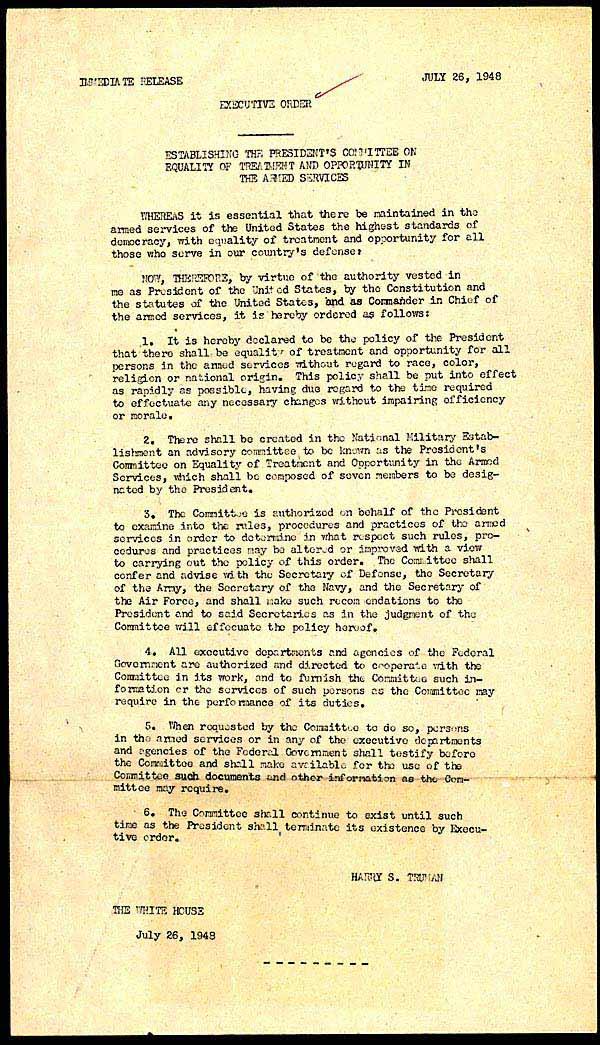Press Release on President's Committee on Equality of Treatment and Opportunity in the Armed Forces

Truman, Harry S. Press Release for Executive Order No. 9981, establishing the President's Committee on Equality of Treatment and Opportunity in the Armed Forces. July 26, 1948. Typescript. NAACP Collection, Manuscript Division.
Immediate Release
July 26 1948
Executive Order Establishing the President's Committee on Equality of Treatment and Opportunity in the Armed Services
WHEREAS it is essential that there be maintained in the armed service of the United States the highest standards of democracy, with equality of treatment and opportunity of all those who serve in our country's defense: NOW, THEREFORE, by virtue of the authority vested in me as President of the United States, by the Constitution and the statutes of the United States, and as Commander in Chief of the armed services, it is hereby ordered as follows: It is hereby declared to be the policy of the President that there shall be equality of treatment and opportunity for all persons in the armed services without regard to race, color, religion or national origin. This policy shall be put into effect as rapidly as possible, having due regard to the time required to effectuate any necessary changes without impairing efficiency or morale. There shall be created in the National Military Establishment an advisory committee to be known as the President's Committee on Equality of Treatment and Opportunity in the Armed Services, which shall be composed of seven members to be designated by the President. The Committee is authorized on behalf of the President to examine into the rules, procedures and practices of the armed services in order to determine in what respect such rules, procedures and practices may be altered or improved with a view to carrying out the policy of this order. The Committee shall confer and advise with the Secretary of Defense, the Secretary of the Army, the Secretary of the Navy, and the Secretary of the Air Force, and shall make such recommendations to the President and to said Secretaries as in the judgement of the Committee will effectuate the policy hereof. All executive departments and agencies of the Federal Government are authorized and directed to cooperate with the Committee in its work, and to furnish the Committee such information or the services of such persons as the Committee may require in the performance of its duties. When requested by the Committee to do so, persons in the armed services or in any of the executive departments and agencies of the Federal Government shall testify before the Committee and shall make available for the use of the Committee such documents and other information as the Committee may require. The Committee shall continue to exist until such time as the President shall terminate its existence by Executive order. Harry S. TrumanThe White House July 26, 1948
Public Domain
Public Domain is a copyright term that is often used when talking about copyright for creative works. Under U.S. copyright law, individual items that are in the public domain are items that are no longer protected by copyright law. This means that you do not need to request permission to re-use, re-publish or even change a copy of the item. Items enter the public domain under U.S. copyright law for a number of reasons: the original copyright may have expired; the item was created by the U.S. Federal Government or other governmental entity that views the things it creates as in the public domain; the work was never protected by copyright for some other reason related to how it was produced (for example, it was a speech that wasn't written down or recorded); or the work doesn't have enough originality to make it eligible for copyright protection.